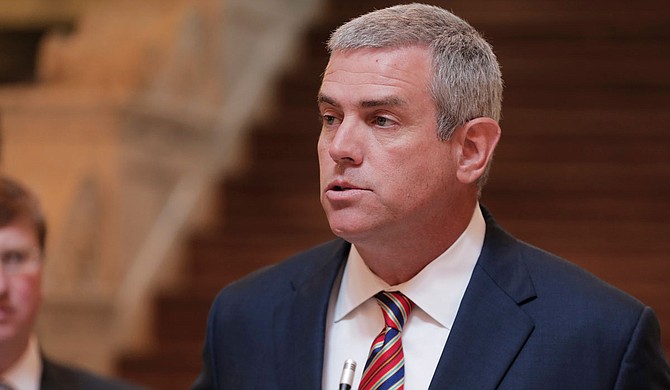Mississippi House Speaker Philip Gunn said financial experts have told legislative leaders that Mississippi government has enough cash on hand to take care of immediate needs caused by the pandemic, including those of the Health Department and the Mississippi Emergency Management Agency. Photo by Imani Khayyam
JACKSON, Miss. (AP) — Mississippi legislators are supposed to set a state spending plan before the new fiscal year begins July 1. The coronavirus pandemic has scrambled most of the planning that budget writers have done the past few months, leaving uncertainty about how a shaky economy will affect tax collections.
“We’ve never seen anything like this in our lifetimes, much less our political lives," Mississippi House Speaker Philip Gunn told The Associated Press on Friday.
The 2020 Mississippi legislative session was set to run from early January until early May. Before the coronavirus became a widespread concern, lawmakers had already agreed to shorten the session by several days, and that would have put the budget-writing deadline in late April.
Then, life changed.
Based on advice from the state health officer, lawmakers left the Capitol in mid-March with a plan to return April 1 or whenever Gunn and Lt. Gov. Delbert Hosemann deem it would be safe.
The two Republican leaders announced Thursday that the session remains on hold indefinitely.
Gunn said financial experts have told legislative leaders that Mississippi government has enough cash on hand to take care of immediate needs caused by the pandemic, including those of the Health Department and the Mississippi Emergency Management Agency.
Congress has passed and President Donald Trump has signed a $2.2 trillion federal stimulus package that includes billions of dollars for states. Republican Gov. Tate Reeves, state lawmakers and others will spend the coming weeks analyzing how Mississippi might use its share.
In normal times, planning for any state budget begins months in advance. State agency directors submitted requests late last summer for money they thought they would need during the year that begins this July 1. The 14-member Joint Legislative Budget Committee held brief public hearings in September.
Relying on analysts working for the Legislative Budget Office, the committee released a document in December showing its recommendations for a nearly $6.3 billion state budget for the coming year. That would be nearly $94 million less than the state is set to spend during the current year, about a 1.5% decrease.
Reeves spent the past two terms as lieutenant governor, and he released his own budget recommendations in late January shortly after becoming governor. He worked within the same $6.3 billion parameter, proposing a pay raise for teachers, an increase for a classroom supply fund that had shrunk in recent years and an increase in spending on workforce development.
Before the virus hit, a teacher pay raise looked like a sure bet.
The Senate had already passed Senate Bill 2001, which would give a $1,000 pay raise to most teachers and teachers' assistants during the year that begins July 1. Slightly larger raises of $1,100 would go to teachers in the first two years of their careers, in an effort to boost the beginning pay and make the jobs more attractive.
The teacher pay raise bill has been assigned to two committees in the House — Education and Appropriations.
“Given all the things that are happening, we can’t make any decisions about anything right now,” Gunn said Friday in response to a question about the teacher pay raise. “We have no idea what the demands on our dollars are going to be.”
Many Mississippians are facing financial uncertainty with jobs they have already lost or jobs they fear losing. Claims for temporary unemployment benefits saw a sharp increase in Mississippi and across the U.S. for the week that ended March 21, according to figures released Thursday.
Amid all the uncertainty, there are bright spots for the Mississippi budget. The state has built up its rainy day fund in recent years. And tax collections were exceeding expectations for the first eight months of the current fiscal year.
Copyright Associated Press. All rights reserved. This material may not be published, broadcast, rewritten, or redistributed.



Comments
Use the comment form below to begin a discussion about this content.
comments powered by Disqus